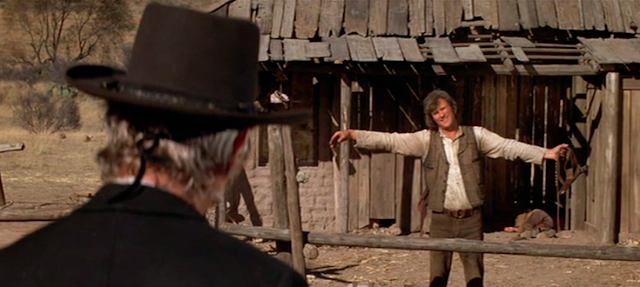 |
| James Coburn and Kris Kristofferson in Pat Garrett and Billy the Kid |
Billy the Kid: Kris Kristofferson
Alias: Bob Dylan
Sheriff Kip McKinney: Richard Jaeckel
Sheriff Baker: Slim Pickens
Mrs. Baker: Katy Jurado
Lemuel: Chill Wills
Chisum: Barry Sullivan
Gov. Lew Wallace: Jason Robards
Ollinger: R.G. Armstrong
Eno: Luke Askew
Poe: John Beck
Alamosa Bill: Jack Elam
Maria: Rita Coolidge
Bowdre: Charles Martin Smith
Luke: Harry Dean Stanton
Director: Sam Peckinpah
Screenplay: Rudy Wurlitzer
Cinematography: John Coquillon
Music: Bob Dylan
With its laid-back pace punctuated by moments of violence, not to mention its soundtrack by Bob Dylan, Pat Garrett and Billy the Kid may be the ultimate stoner Western. After being mutilated by MGM -- the credits list six film editors -- it was savaged by critics on its first release, but the release on video of Sam Peckinpah's original preview version in 1988 caused a reevaluation of the film, with some now calling it a masterpiece. I wouldn't go that far: To my mind the narrative is still too elliptical and the inspiration -- rewriting a myth -- too commonplace. But it has moments of brilliance that transcend its flaws, such as the beautiful sequence of the death of Sheriff Baker, with its fine use of the iconic performers Slim Pickens and Katy Jurado and the underscoring with Dylan's "Knockin' on Heaven's Door." James Coburn, always an underrated actor in his prime, is wonderful as Pat Garrett, and while Kris Kristofferson was never much of an actor, he and Coburn play well against each other. Dylan was no actor, either, but he's used well here as the enigmatic figure who lets himself be known as "Alias," and the scene in which Garrett forces him to read the labels of canned goods while he toys with other members of Billy's gang is nicely done. The gallery of character actors both old (Chill Wills, Jack Elam) and new (Charles Martin Smith, Harry Dean Stanton) is welcome. Its post-censorship era's exploitation of women -- there are an awful lot of bared breasts, though we also get a fleeting butt-shot of Kristofferson -- is overdone, and it certainly wouldn't earn any seal of approval from the American Humane Society after the scene in which live chickens are used for target practice.
Turner Classic Movies